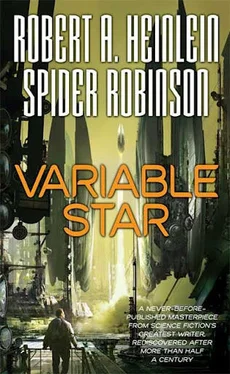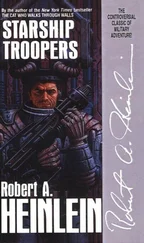And that wasn’t all….
There was, Robert said, an outline for an entire novel that no one knew about, that Heinlein had never gotten around to writing. What it read like, he said, was a classic Heinlein Juvenile, and indeed it had been dreamed up around the time he was writing them, and—
—and from the back of the room, a woman I could not see called, in a loud, clear, melodious voice:
“You should get Spider Robinson to finish that novel.”
And there was applause.
One of the other people on that panel was Eleanor Wood, literary agent for the estate of Robert A. Heinlein—and also, as it happens, for me . Another was Art Dula, trustee for the estate and its half-million-dollar Heinlein Prize Trust (see www.heinleinprize.com for details)… and Robert’s literary executor. Glances were exchanged. Immediately after the panel ended, words were exchanged.
I was, please understand, profoundly terrified that this cup might actually come to me. It was quite literally the most difficult and intimidating challenge that could possibly be handed a science fiction writer, a red flag to critics. It was like a musician being asked to write, score, produce, perform, and record an entire album based on a couple of John Lennon demo cassettes. In boxing it’s called leading with your chin. But I was fifty-five years old, just in the mood for the challenge of my life. Most of all, I wanted to read a new Heinlein novel so badly, I didn’t care if I had to finish it myself, didn’t care what kind of grief it cost me to do so.
Once again, a woman I didn’t know had changed my life.
I’m delighted to report that she did not remain anonymous. I sent this Afterword around to some of those mentioned in it for corrections, and one of them was David M. Silver, President of the Heinlein Society ( www.heinleinsociety.org ), who was also on that panel. He was able to identify my benefactress as a member of his esteemed society. Thank you from the bottom of my heart, Kate Gladstone!
Shortly after I returned home from Torcon 3, I received Robert’s outline, and permission to write two sample chapters and a proposal for Art Dula; if he liked them, the gig was mine. Wild with exultation, I fell upon that outline and read it three times with extreme care.
And then I began banging my head on my desk. Gently, at first.
You may recall I stated earlier that Robert’s outline ran at least eight pages. It may have run fifty, for all anybody knows. What we do know is, seven of them survive.
They establish the ficton—Robert’s term for the time-and-place in which a story is set. They create vivid characters and their back stories, especially Joel, Jinny, and her grandfather. They describe the basic antinomy that impels Joel to emigrate, discuss the economics of interstellar colonization, and sketch in some of his early adventures after he leaves.
And then they chop off in midsentence, and midstory.
My God, I said to myself, the first time I finished reading the outline, there’s no furshlugginer ending! It could go anywhere from here ….
God, this is great! I said to myself the second time I finished it, I not only get to write a book with Robert, I get to pick the ending.
Dear God, I moaned to myself after the third reading, what the hell am I going to do for an ending?
I holed up in my office for a week, and stared at those seven pages and fourteen quasilegible index cards and asked myself that question until beads of blood began to form on my forehead. Barring another miracle of forensic scholarship, this was going to be the very last Robert Heinlein novel ever. No ending I thought of seemed adequate. Twice a day my wife poked food in with a stick and retired to safety. I played my entire iTunes music library in search of inspiration, staring at its hypnotic visual display on my Powerbook screen, thinking like mad.
And one afternoon, iTunes finished playing the last Ray Charles album on my hard drive, and defaulted to the next artist in alphabetical order.
Robert Anson Heinlein.
Half a dozen short mp3 audio clips, of him being interviewed on radio in his hometown, Butler, Missouri, on its first-ever Robert A. Heinlein Day back in 1987, a year before his death. I’d listened to all those clips often. But the first one in line made me sit bolt upright in my chair now.
There—in my GrandMaster’s Own Voice—was the rest of our novel, and the inspiration for its new title, in a single unscripted sentence. Two clips later, he said it again , indifferent words. Suddenly I recalled Robert griping to me once in a phone conversation about a story he’d always wanted to tell, that John W. Campbell had argued him out of writing….
You have read both those soundbites. They were the chapter-opening quotes for Chapters 17 and 18.
That quickly, the novel finished itself in my mind. All that remained was the comparatively trivial business of writing those first two sample chapters and a proposal, winning Art’s approval, marketing the novel, selling it to Tor Books—oh, yes, and then typing 115,051 words, configuring them in sentences, arranging those into paragraphs, and separating them into chapters. Every waking moment of two years of my life, tops.
Two Novembers later, the task is completed, to the best of my ability.
And well beyond. Fortunately I had help. Even more so than any of my previous thirty-two books, I could not conceivably have completed this one without the generous and patient assistance of many people far more knowledgeable and intelligent than myself. We have come now, in other words, to the closing credits.
My principal consultants and unindicted co-conspirators were the gentlemen who have assisted me with all of my recent novels, the Vancouver Lunar Circle, particularly engineers Guy Immega and Ray Maxwell, physicist Douglas Beder, and astronomer Jaymie Matthews. Once my colleague and friend Allen M. Steele ( www.allensteele.com ) and noted rocket scientist Jordin Kare had helped me decide what kind of starship I wanted, Guy, one of my oldest friends, designed the Sheffield with Doug and Ray for me, treating the Ikimono Drive I handed them as a black box. Guy and his daughter Claire created Brasil Novo together in the course of a bedtime story they spent several years telling themselves, calling it “Jungle World,” and latterly Jaymie added a few refinements to help it retain its atmosphere. Jaymie also figured out how to make its star satisfy the odd requirements I needed, and educated me about the destruction of my own star, its precursors and its consequences, as well as consulting on cosmology in general. Doug saved my bacon over and over, not only working and reworking complex relativistic computations in what appeared to be zero time, but continually suggesting ingenious ways to make the answers serve the needs of the story. And each of these Lunarians made invaluable comments on the work of the others.
Allen was also enormously helpful in helping me visualize what interstellar flight would actually be like , over a period of years, having devoted considerable thought to the matter for his own terrific Coyote novels. To help me imagine what a starship’s farm that feeds five hundred might look like, however, I went straight to the man himself: Dr. Raymond M. Wheeler of NASA’s Biological Sciences Office, who’s designing the farm that will feed astronauts on their way to Mars; he gave generously of his time and special knowledge. The goat lore I acquired myself, painfully, a long time ago in Nova Scotia.
One more technical adviser must be thanked who, like Dr. Wheeler, had never previously helped me with a book, yet proved invaluable this time. Everything I know about the sax I learned by either listening to, watching, or questioning my friend Colin MacDonald ( www.crypticmusic.ca ), a composer, saxophonist, Soto Zen monk, and in his spare time (!) the keeper of my Web site www.spiderrobinson.com.
Читать дальше










